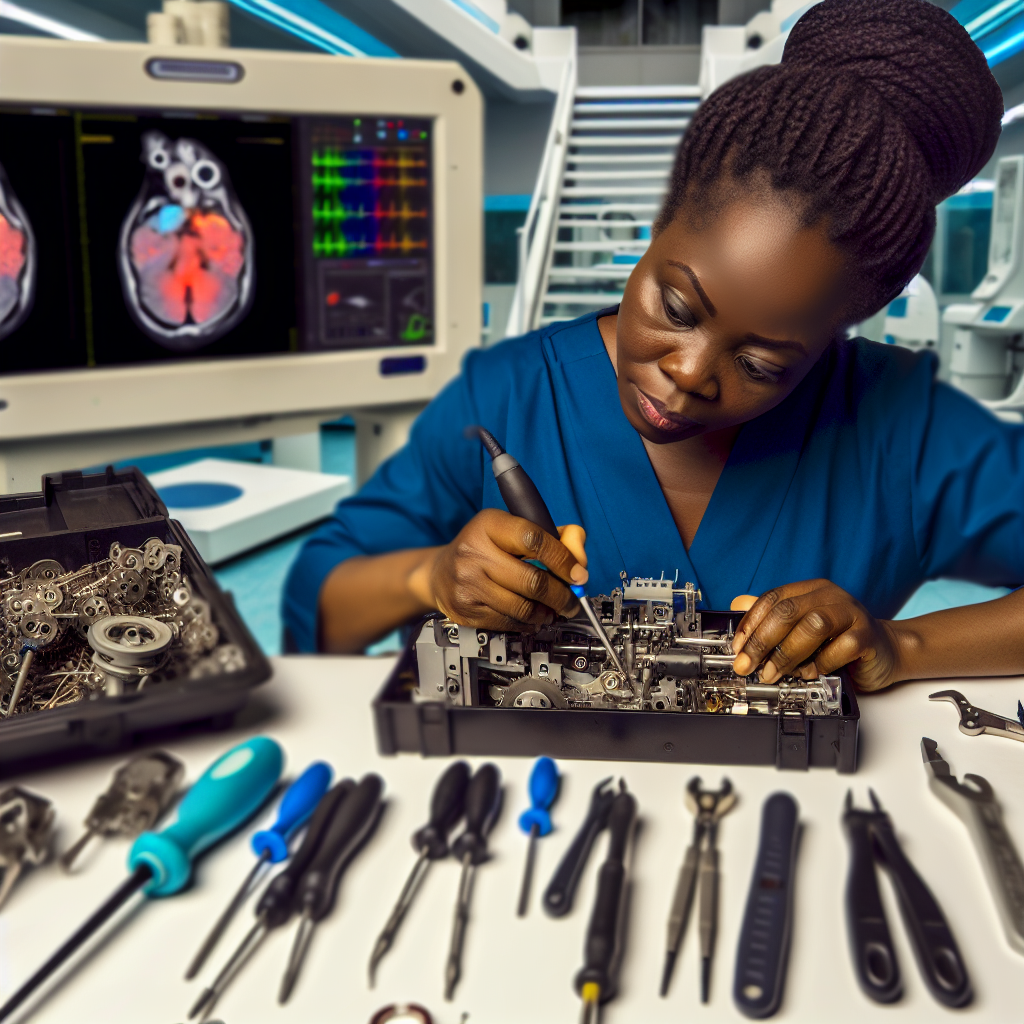Introduction
A biomedical engineer is a professional who combines engineering principles with medical sciences to design and create innovative healthcare solutions.
Biomedical engineering plays a crucial role in advancing medical technology, improving patient care, and enhancing overall healthcare delivery.
In Nigeria, the field of biomedical engineering is rapidly growing, with increasing demand for skilled professionals in hospitals, research institutions, and medical device companies.
Educational Requirements
To become a biomedical engineer in Nigeria, you need detailed academic qualifications.
It is essential to excel in science and mathematics subjects during secondary school.
These subjects form the foundation for a successful career in biomedical engineering.
Importance of Science and Mathematics Subjects
Science and mathematics subjects are crucial for aspiring biomedical engineers.
These subjects provide the necessary knowledge and skills in problem-solving, critical thinking, and analysis.
In the field of biomedical engineering, a strong understanding of biology, chemistry, physics, and mathematics is imperative.
These subjects lay the groundwork for students to comprehend complex medical technologies and systems.
Relevant Degree Programs in Nigerian Universities
Several Nigerian universities offer relevant degree programs in biomedical engineering.
- University of Lagos: Offers a Bachelor of Science in Biomedical Engineering.
- Ahmadu Bello University: Provides a Bachelor of Engineering in Biomedical Engineering.
- University of Nigeria, Nsukka: Offers a Bachelor of Engineering in Biomedical Engineering.
These degree programs focus on equipping students with the necessary skills and knowledge in biomedical engineering.
The curriculum covers various areas such as biomaterials, biomechanics, biomedical instrumentation, and medical imaging.
Students also engage in practical training and internships to gain hands-on experience in the field.
Pursuing a degree in biomedical engineering from a reputable Nigerian university is a crucial step towards achieving a successful career in this dynamic and rewarding field.
Skillset and Personal Attributes
Essential skills and qualities required for a successful career as a biomedical engineer.
Biomedical engineering is a field that requires a unique blend of technical, analytical, and interpersonal skills.
To excel in this profession, individuals must possess certain attributes that set them apart from others.
Here are some essential skills and qualities required for a successful career as a biomedical engineer:
- Strong problem-solving skills: Biomedical engineers are tasked with solving complex problems related to healthcare technology.
- Analytical thinking: In addition to problem-solving skills, biomedical engineers must possess strong analytical thinking abilities.
- Attention to detail: Precision is paramount in biomedical engineering, as even the smallest error can have serious consequences.
Problem-solving, analytical thinking, and attention to detail are not just desirable traits for biomedical engineers.
They are essential for success in this field.
Biomedical engineers are responsible for developing innovative solutions to complex healthcare challenges.
This requires a high level of technical expertise and critical thinking skills.
By emphasizing problem-solving skills, analytical thinking, and attention to detail, biomedical engineers can effectively design, develop, and implement medical devices, diagnostic tools, and treatment methods that improve the quality of patient care and outcomes.
While technical skills are crucial for biomedical engineers, communication skills and teamwork are equally important.
Biomedical engineers often collaborate with healthcare professionals, researchers, and industry partners to develop and implement new technologies and therapies.
Effective communication is essential for conveying ideas, sharing information, and collaborating on projects.
By working collaboratively with multidisciplinary teams, biomedical engineers can leverage diverse perspectives and expertise to innovate and create impactful solutions that benefit patients and healthcare providers.
Learn More: Innovative Surveying Methods for Nigerian Landscapes
Professional Experience and Internship
Aspiring biomedical engineers in Nigeria should seek practical experience through internships.
Internship opportunities allow students to gain hands-on experience in the field.
Having real-world experience can set you apart from other job applicants.
Internships provide a chance to apply theoretical knowledge to practical situations.
Benefits of Gaining Hands-on Experience
- Hands-on experience helps students develop essential skills in biomedical engineering.
- Internships expose individuals to the daily challenges faced by professionals in the industry.
- Working in a real-world setting enhances problem-solving abilities and critical thinking skills.
- Interns have the opportunity to network with professionals and build industry connections.
Advice on Securing Internships
- Start by researching reputable organizations that offer internship programs in biomedical engineering.
- Check the eligibility requirements and application process for each internship opportunity.
- Prepare a well-written resume and cover letter highlighting your skills and interest in the field.
- Reach out to your professors, colleagues, or career services for recommendations and referrals.
Find Out More: Collaboration Opportunities in Nigerian Biomedical Engineering
Certification and Licensing
Professional certifications and licenses are essential for biomedical engineers in Nigeria.
Regulatory bodies oversee the practice of biomedical engineering in the country.
Compliance with industry standards and regulations is crucial for biomedical engineers.
Overview of Professional Certifications and Licenses
Biomedical engineers in Nigeria must obtain the necessary certifications and licenses to practice in the field.
The certifications demonstrate competence and expertise in the profession.
Licenses legally allow individuals to work as biomedical engineers.
Transform Your Career with Expert Guidance
Get personalized mentorship consulting that’s tailored to your unique path. Our expert advice is actionable and exclusive.
Get StartedSome of the certifications that may be required include:
- Professional Engineer (PE) Certification
- National Biomedical Engineering Certification
- Health Technology Certification
- Clinical Engineering Certification
Information on Regulatory Bodies
In Nigeria, the Council for the Regulation of Engineering in Nigeria (COREN) and the Medical Laboratory Science Council of Nigeria (MLSCN) are the regulatory bodies that oversee the practice of biomedical engineering.
These organizations ensure that biomedical engineers adhere to professional standards and ethical guidelines.
Importance of Complying with Industry Standards
Compliance with industry standards and regulations is crucial for biomedical engineers to ensure the safety and effectiveness of medical equipment and devices.
By complying with these standards, biomedical engineers contribute to the overall quality of healthcare delivery in Nigeria.
Uncover the Details: Impact of Climate Change on Land Surveying Practices

Career Prospects and Opportunities
Biomedical engineering is a rapidly growing field in Nigeria.
A variety of career pathways and job opportunities are available to professionals in this sector.
Here, we will explore the different options for biomedical engineers.
We will also look at the potential employers in the healthcare and medical device industries.
Exploration of Career Pathways
- Biomedical Researcher: Conducting research to develop new medical technologies.
- Medical Device Designer: Designing and testing medical equipment and devices.
- Clinical Engineer: Managing and maintaining medical equipment in healthcare facilities.
- Regulatory Affairs Specialist: Ensuring compliance with regulations in the healthcare industry.
- Biomedical Consultant: Providing expertise to healthcare organizations on technological solutions.
- Healthcare Administrator: Overseeing the management of healthcare facilities.
Job Opportunities in Nigeria
There are various potential employers in Nigeria for biomedical engineers.
- Hospitals and Healthcare Facilities: Providing opportunities in equipment management and maintenance.
- Medical Device Companies: Employing professionals in design, testing, and regulatory affairs.
- Research Institutions: Offering roles in biomedical research and development.
- Government Agencies: Hiring engineers for healthcare policy and regulation roles.
- Universities and Academia: Providing teaching and research opportunities in the field.
Salary Ranges and Growth Prospects
Biomedical engineers in Nigeria can expect competitive salary ranges.
The average salary for biomedical engineers ranges from ₦120,000 to ₦300,000 per month.
This depends on experience and qualifications.
As the healthcare industry continues to expand and invest in new technologies, the demand for biomedical engineers is expected to grow.
This presents excellent growth prospects for professionals in the field.
There are opportunities for career advancement and specialization.
Pursuing a career in biomedical engineering in Nigeria can lead to a fulfilling and rewarding professional journey.
It offers a diverse range of career pathways, job opportunities, and potential for growth in the field.
Delve into the Subject: Importance of Mechatronics in Nigerian Economy
Pathway to a Career in Biomedical Engineering
Becoming a biomedical engineer in Nigeria requires dedication and commitment.
Pursuing a relevant degree in engineering or a related field is essential.
Internships and practical experience are crucial for gaining knowledge and skills.
Networking with professionals in the industry can open opportunities for growth.
Continuous learning and staying updated with the latest technologies is vital.
Aspiring biomedical engineers should never give up on their dreams.
Persevering through challenges is key to success.
I encourage all individuals with a passion for healthcare and technology to pursue this exciting career.
Take proactive steps such as researching programs and reaching out to universities for guidance.
With hard work and determination, you can become a successful biomedical engineer in Nigeria.
Additional Resources
Biomedical Engineering in Nigeria: A Developmental Overview …
Nigerian Science Prize win and presidential honour for Imperial …




